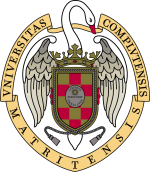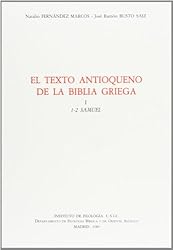 That widely celebrated occasion is upon us again: Happy 11th International Septuagint Day! As I have in the past, I encourage you to take up your well-worn edition of the Greek Old Testament and read a bit today in recognition of this joyful day.
That widely celebrated occasion is upon us again: Happy 11th International Septuagint Day! As I have in the past, I encourage you to take up your well-worn edition of the Greek Old Testament and read a bit today in recognition of this joyful day.
If you are unfortunate enough to be uninformed about International Septuagint Day, fear not. I have written about it before, which you can read here:
ISD 2016 | ISD 2015 | ISD 2014
Celebrating with an Interview
 As I did in 2015, today I will celebrate by posting an interview with a scholar in the discipline. This is now my tenth LXX Scholar Interview, and there are lots more in the pipeline. Today we have the pleasure of hearing from Dr. Natalio Fernández Marcos, who is part of the Consejo Superior de Investigaciones Científicas (CSIC) in Madrid. If you have read this blog in the past and his name seems familiar, that is because I have featured the recent Spanish translation of the Septuagint, La Biblia Griega (see here and here).
As I did in 2015, today I will celebrate by posting an interview with a scholar in the discipline. This is now my tenth LXX Scholar Interview, and there are lots more in the pipeline. Today we have the pleasure of hearing from Dr. Natalio Fernández Marcos, who is part of the Consejo Superior de Investigaciones Científicas (CSIC) in Madrid. If you have read this blog in the past and his name seems familiar, that is because I have featured the recent Spanish translation of the Septuagint, La Biblia Griega (see here and here).
You may also recognize Dr. Fernández Marcos’s name from the recent interview I posted with one of his students, José Manuel Cañas Reíllo. Let’s hear from Dr. Fernández Marcos.
The Interview
1) Can you describe how you first became interested in LXX studies, and your training for the discipline?
 After completing my academic studies and doctoral dissertation in the Complutensian University of Madrid, I started working in a research project called Biblia Polyglotta Matritensia, developed in the Consejo Superior de Investigaciones Científicas (CSIC) in conjunction with the universities of Madrid and Barcelona. As a graduate in Classics from the University of Salamanca and in Trilingual Biblical Philology from the University of Madrid,
After completing my academic studies and doctoral dissertation in the Complutensian University of Madrid, I started working in a research project called Biblia Polyglotta Matritensia, developed in the Consejo Superior de Investigaciones Científicas (CSIC) in conjunction with the universities of Madrid and Barcelona. As a graduate in Classics from the University of Salamanca and in Trilingual Biblical Philology from the University of Madrid, I was appointed to edit a text of the Septuagint for this project. I was introduced to the Septuagint by Manuel Fernández-Galiano, Professor of Classics in the University of Madrid, who was then publishing the editio princeps of some pages of Papyrus 967.[1]
In 1971 I landed in Göttingen with a grant of the Deutsche Akademische Austauschdienst (DAAD) to work in the Septuaginta-Unternehmen under the direction of Prof. Dr. Robert Hanhart. Spain had no recent tradition in Biblical philology, but I was aware of our brilliant tradition in the 16th century. Spanish Humanism had produced the first two Polyglot Bibles, that of Alcalá (1514-1517), and the Antwerp Polyglot (1569-1573).
Given the progress of the series maior of the Septuaginta-Unternehmen in Göttingen, I soon understood that there was no reason to repeat the excellent work done at Göttingen, and no way to compete with such a prestigious undertaking. Consequently I decided, on the advice of Hanhart, Wevers and Barthélemy, to edit, not the Old Greek or the Ur-Septuaginta, but instead a recension, a stage of the text history. The stimulus for this came from an influential article published in 1970 by S. P. Brock,[2] which concluded with the following sentence
“… many scholars would like to see an edition of the LXX as current, say, in fourth century Antioch, to give but one example that might actually be feasible”.
2) How have you participated in the discipline over the course of your teaching and writing career?
Consequently, in order to prepare the Antiochene edition of the Greek Bible, we started with Theodoret’s critical edition of his Quaestiones in Octateuchum (Madrid 1979) and his Quaestiones in Reges et Paralipomena (Madrid 1984). Theodoret was the best witness to the Antiochene text, and we needed a sound criterium to isolate and identify the Antiochene Recension. The lack of critical editions of the Fathers was one of the main obstacles to restore critically the Antiochene text of the Septuagint.
 Since there was no Antiochene Recension in the Octateuch (a conclusion shared by Wevers after his edition of the Pentateuch in Göttingen, and by us, after the edition of Theodoret’s Questions to the Octateuch), I decided to edit the Antiochene text in the historical books, where it was clearly defined with a set of peculiar characteristics.
Since there was no Antiochene Recension in the Octateuch (a conclusion shared by Wevers after his edition of the Pentateuch in Göttingen, and by us, after the edition of Theodoret’s Questions to the Octateuch), I decided to edit the Antiochene text in the historical books, where it was clearly defined with a set of peculiar characteristics.
After collation and study of all the Antiochene witnesses, manuscripts, Josephus, and the Vetus Latina, Armenian version and Patristic quotations, we were able to edit in three volumes The Antiochene Text of the Greek Bible for the Historical Books (1-2 Samuel, Madrid 1989; 1-2 Kings, Madrid 1992; 1-2 Chronicles, Madrid 1996). The critical edition was followed by a Greek-Hebrew Index of the Antiochene Text in the Historical Books, in two volumes: I, General Index and II, Index of proper names, Madrid 2005 (see here).
 Parallel to this editorial work I published in 1979 my Introducción a las versiones griegas de la Biblia, Madrid CSIC; 2nd edition revised and augmented in 1998. This second edition was translated into English (Brill 2000 and SBL 2009 – see here) and into Italian (2000). I also edited the Proceedings of the Vth Congress of the IOSCS held in Salamanca (1983) with the title La Septuaginta en la investigación contemporánea (Madrid, CSIC 1985).
Parallel to this editorial work I published in 1979 my Introducción a las versiones griegas de la Biblia, Madrid CSIC; 2nd edition revised and augmented in 1998. This second edition was translated into English (Brill 2000 and SBL 2009 – see here) and into Italian (2000). I also edited the Proceedings of the Vth Congress of the IOSCS held in Salamanca (1983) with the title La Septuaginta en la investigación contemporánea (Madrid, CSIC 1985).
3) How have you integrated LXX studies into your work as a professor?
The direction of the research project “Edition of Biblical and Para-Biblical Texts (Biblia Polyglotta Matritensia)” consumed most of my academic time. In the CSIC we are mainly dedicated to research and we offer only sporadically courses for postgraduates in connection with our field of specialization.
In 1991 and 1992 I was invited to give the Grinfield Lectures at the University of Oxford. The revised version of these Lectures was published by Brill in the Supplements to Vetus Testamentum with the title Scribes and Translators: Septuagint and Old Latin in the Books of Kings (Leiden 1994). In 2008 I was appointed to give the Jeremie Lecture at the University of Cambridge. I also published La Biblia griega de  judíos y cristianos (Salamanca, Sígueme 2008; 2nd edition 2014 [first edition translated into Italian in 2010]).
judíos y cristianos (Salamanca, Sígueme 2008; 2nd edition 2014 [first edition translated into Italian in 2010]).
4) How has the field changed since you’ve been involved?
I would say that the Septuagint studies have experienced a kind of revolution or “democratization”. When I started studying, it was a field limited to a few specialists. At this moment it is a consolidated field within the Biblical studies in constant expansion. In this process I think that the LXX.D project has played an important role not only for Septuagint studies in Germany but also in other countries. Besides, the publication of the Qumran documents has contributed to put the Septuagint in the forefront of research, since the history of Biblical text has to be completely re-written after the new evidence of Qumran and Septuagint (new editions, new papyri, etc.).
5) For the benefit of graduate students who are potentially interested in LXX studies in doctoral work, what in your opinion are underworked areas and topics in need of further research?
Underworked are most of the areas of Septuagint, from the critical editions to the reception, lexicography, grammar, syntax… Deissmann compared at the beginning of the 20th century the language of the New Testament with the language of the papyri. But nobody has continued systematically his work. Since then, a lot of new evidence has been published along the 20th century in the field of the Septuagint and in the area of new papyri. I feel the need of a new program of comparison of the language of the Septuagint in the light of new papyri and inscriptions, with the aim to set the language of the LXX in the context of the history of the Greek language in general, especially of the Greek in the Greco-Roman period. There is also a need for a study of the Septuagint as a literary work of his own.
6) What current projects in Septuagint are you working on?
We have just finished the new translation of the Septuagint into Spanish (La Biblia griega. Septuaginta, I-IV, Salamanca, Ediciones Sígueme 2008-2015). At the moment we are revising the first volume on the Pentateuch for the second edition, since the first is out of print. Thereafter we will revise the rest of volumes that will continue to be edited as academic edition. Subsequently, we will revise the four volumes in order to publish them in a single volume manual edition with the whole Septuagint into Spanish and directed to a different audience.
7) What is the future of Septuagint studies?
Although the Septuagint still is not consolidated as discipline in our universities, our students of Classics are more and more interested in the Greek Bible and the history of the Greek Language in late Antiquity. As the Qumran documents have demonstrated, the importance of the Septuagint for the history of the biblical text is becoming fundamental, and no less the indispensable use of the Septuagint for text criticism and literary criticism.
Wrapping Up
I am extremely grateful to Dr. Fernández Marcos for his time, and more so for his excellent work in Septuagint studies. Stay tuned for further interviews with experts who have shaped the discipline.
__________________
[1] M. Fernández-Galiano, “Nuevas páginas del Códice 967 del A. T. griego (Ez 28,19-43,9) [PMatr. bibl. 1].” Studia Papyrologica 10 (1971): 7-76.
[2] S. P. Brock, “Origen’s aim as a Textual Critic of the Old Testament”, Studia Patristica = TU 107, Berlin 1970, 215-218.
Dear Will,
Thanks so much for this ongoing series–I hope that (1) many will consider LXX for their own studies; and (2) will read these interviews for both insight and encouragement. Great questions and answers both.
Thanks again.
fred
Thanks Fred! I hope so as well.